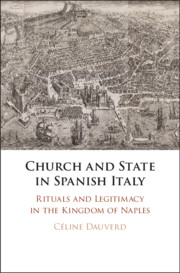Book contents
- Church and State in Spanish Italy
- Church and State in Spanish Italy
- Copyright page
- Contents
- Figures
- Table
- Acknowledgments
- Introduction
- 1 The Spaniards in Charitable Institutions
- 2 Viceroys, Jews, and Conversos
- 3 The Miracle of San Gennaro
- 4 Easter Processions
- 5 Corpus Domini Celebration
- 6 San Giovanni a Mare
- Conclusion
- Bibliography
- Index
Introduction
Published online by Cambridge University Press: 09 March 2020
- Church and State in Spanish Italy
- Church and State in Spanish Italy
- Copyright page
- Contents
- Figures
- Table
- Acknowledgments
- Introduction
- 1 The Spaniards in Charitable Institutions
- 2 Viceroys, Jews, and Conversos
- 3 The Miracle of San Gennaro
- 4 Easter Processions
- 5 Corpus Domini Celebration
- 6 San Giovanni a Mare
- Conclusion
- Bibliography
- Index
Summary
In 1506, King Ferdinand of Aragón (the Catholic monarch of Spain) made his solemn entry into Naples with his new wife, Germaine de Foix. A controversy arose preceding the perambulation of the royal cortege when the representatives of the city districts (seggi), the nobility, and the common people disagreed over who should hold the baldachin’s banners.3 These difficulties were resolved with the mooring of the sovereigns’ vessel. The city’s ships and castles fired canons as a salutation for the royal couple. In order to provide social balance, the population decided that the members of the popular district would hold the baldachin’s banners while the nobles would hold the royal horse’s straps. Viceroy Don Gonzalvo de Córdoba (r. 1504–1507) greeted the king, followed by the dignitaries of the kingdom. Ferdinand swore to uphold the kingdom’s privileges and headed a perambulation that took him to the principal arteries of the city. Important Roman dignitaries of the Colonna family held the royal standard, followed by the Neapolitan barons, the diplomatic corpus, Cardinals Luigi Borgia and Francesco Remolines, and the Archbishop of Sorrento. Ritual precedence was of utmost significance, and for the sake of the city’s welfare and its subjects’ representation, the viceroy enabled the common people to occupy a significant role in the city procession. The Spanish kings, first Aragonese and then Habsburgs, gained the acceptance of the people not only by granting them protection, but also by demonstrating a respect for local customs. The offering of peace, justice, security, and harmony was a type of political conduct defined as buon governo or good government, the main theme of this book.
- Type
- Chapter
- Information
- Church and State in Spanish ItalyRituals and Legitimacy in the Kingdom of Naples, pp. 1 - 30Publisher: Cambridge University PressPrint publication year: 2020



